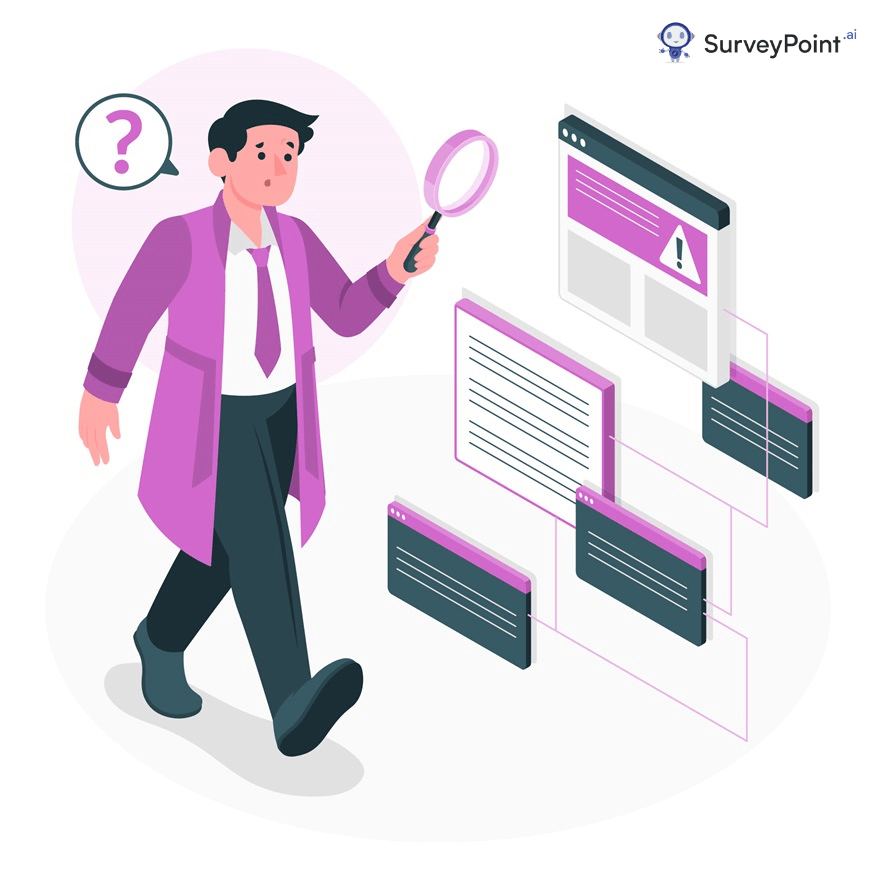
Conceptual research involves identifying major theories and frameworks to provide a better understanding by examining relationships between different concepts. This is a valuable tool for researchers to develop new ideas and theories as well as refine existing ones.
This research helps to understand the meaning of abstract concepts, such as “love” or “happiness.” It develops new theories that explain a phenomenon or a problem. The research aims to provide a better understanding of existing theories and ideas.
Conceptual research can identify and assess the potential implications of policies and decisions to identify knowledge gaps. All in all, it provides a basis for developing more concrete research plans and designing experiments. This helps gain a better understanding of abstract concepts.
Purpose of Conceptual Research
The research method serves the following purposes for researchers:
- To understand the underlying meanings, beliefs, motives, and intentions of individuals and organizations.
- Identifying and exploring new ideas, theories, and hypotheses.
- Generating potential solutions to a problem.
- To examine and compare different perspectives on a particular issue.
- Providing a deeper understanding of a phenomenon.
What Does a Framework of Conceptual Research Entail?
A framework for conceptual research entails the development of a set of ideas, principles, assumptions, and theories that form the basis of a hypothesis or inquiry. It includes defining concepts and identifying their relationships, which helps formulate a hypothesis with the aim of a research design.
The framework also focuses on guidance and selection of data sources, methods employed for analysis, strategies for data collection, and the interpretation of results. The framework provides a clear roadmap for the research process, which includes the selection of research questions, the justification of data sources, and the evaluation of outcomes.
Example of Conceptual Analysis
Conceptual research is a research method that seeks to explore and explain concepts and ideas. For example, a study conducted to explore the concept of “social media addiction” examined the usage, interaction, and perception of social media among different people.
In this research, the researchers might explore the concept of social media usage and the psychological well-being of its users, and how one copes with difficult life situations through social media. Another aspect that could be explored is how the use of social media affects the personal relationships that they maintain with friends and family.
This research may also evaluate the concept of “addiction” more broadly and how social media usage fits into a larger framework of addiction and its direct or indirect influence on people’s lives.
ALSO READ: Unlocking Valuable Insights With Theoretical Research What Are The Conceptual Research Advantages?
Glance over the advantages of conceptual research for a better understanding of the methodology:
- Provides a broad framework for understanding a particular phenomenon or problem.
- Researchers can identify and explore relationships among abstract concepts.
- Helps in developing new theories and ideas.
- It provides a way to analyze data and draw meaningful conclusions.
- Assists researchers to identify gaps in existing research and develop new research questions.
- Evaluates existing theories and suggest improvements.
- It helps researchers build a comprehensive understanding of a topic.
ALSO READ: Survey Data Collection: How to Get the Best Results? What Are The Conceptual Research Disadvantages?
The following are the limitations while conducting conceptual research:
- With the research often being qualitative in nature, it is difficult to measure results and draw conclusions from the research.
- Since it relies heavily on subjective interpretation, it can be difficult to replicate the same study with different participants.
- This research often requires researchers to conduct several interviews and observations, which can be time consuming.
- As conceptual research relies heavily on the interpretation of the researcher, it can be subject to researcher bias.
- Data analysis is challenging, and since this research is often qualitative in nature, it can be difficult.
ALSO READ: Why do Researchers Prefer Conducting Pilot Surveys in 2023? Conceptual Research Vs Empirical Research
As was previously mentioned, the primary goal of conceptual research is to get a deeper understanding of a concept or theory, or to investigate the connections between various theoretical frameworks. You can accomplish this by reading several articles and books to understand the topic at hand comprehensively.
The difference between this and empirical research is that the latter relies on data gleaned from actual experiments, observations, and measurements. Researchers can test hypotheses, explore relationships between variables, or evaluate the effectiveness of a planned or predetermined intervention. It involves data collection and analysis to draw conclusions based on the results.
A few differences between the following are:
- Conceptual research focuses on understanding the relationships and theories between concepts, while empirical research focuses on observing and measuring phenomena.
- The focus is on using theories and philosophies to interpret data for conceptual research, whereas empirical research relies on collecting and analyzing real-world data.
- Qualitative research techniques, like focus groups and interviews, are common in conceptual research. Meanwhile, empirical research typically uses quantitative methods, such as surveys and experiments.
- Developing new theories or refuting established ones frequently involves conceptual research. Empirical research exclusively tests already existing hypotheses.
- Conceptual research explores and develops abstract ideas. On the other hand, empirical research is used to explore and answer concrete questions.
Conclusion
Conceptual research helps you gain an insightful perspective on complex and abstract concepts, which can be further applied to broader contexts. Researchers, educators, and policymakers employ this tool, as it can help inform decisions that impact large populations and societies.
Ultimately, this research can be used to gain insight into essential questions, create new knowledge, and explore the unknown.




